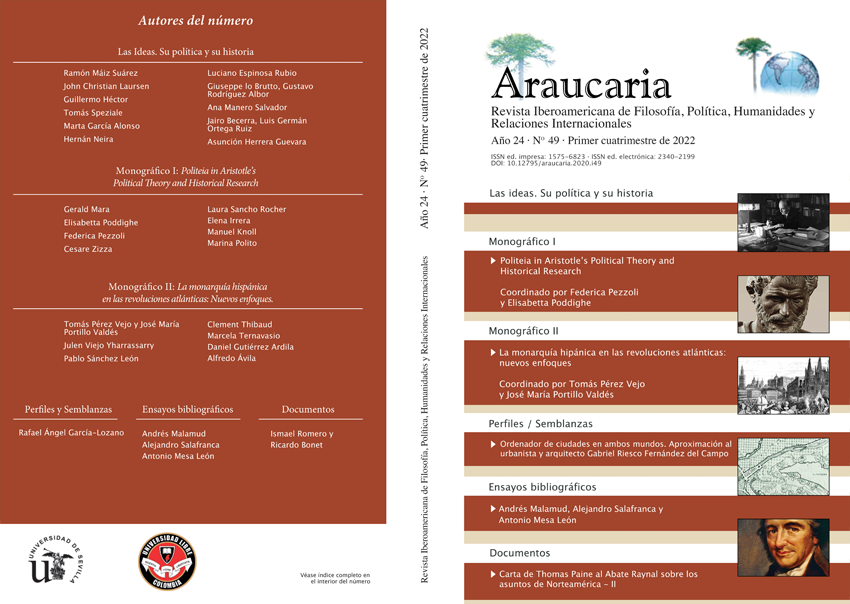The ecclesiological/political problem of Leviathan in context
DOI:
https://doi.org/10.12795.05Keywords:
Hobbes, Leviathan, ecclesiology, church, credo minimun, political theologyAbstract
This paper discusses the reach of ecclesiastical power in Hobbes' Leviathan, examining how the State acquires some of the roles traditionally played by the Church. I will first contextualize historically the ecclesiological debates on which Leviathan draws. Then, I will examine the essential role Hobbes assigns to the king in the governance of the church. Although Hobbes' political theology is often deemed atheist, in Leviathan the king becomes the institutional head of the Church. Moreover, he should establish a minimal Christian creed to be shared by his subjects, in order to preserve religious peace among the different churches of his kingdom.
Downloads
References
Bibliografía
Bejan, T. M., “Difference without Disagreement: Rethinking Hobbes on “Independency” and Toleration,” The Review of Politics, 78 (2016), pp. 1–25
Collins J. “Christian Ecclesiology and the Composition of Leviathan: A Newly Discovered Letter to Thomas Hobbes”, The Historical Journal, 43/ 1 (2000), pp. 217-231.
_ The Allegiance of Thomas Hobbes, Oxford, Oxford University Press, 2005
_ “All the Wars of Christendom: Hobbes’s Theory of Religious Conflict”, en Laurens van Apeldoorn y Robin Douglass, eds.: Hobbes on Politics and Religion, Oxford, Oxford University Press, 2018
Craig H., “The Geneva Bible as a Political Document”, The Pacific Historical Review, 7 (1938), pp. 40-49
Day, A.,“Hobbes’s changing Ecclesiology,” The Historical Journal, 62/4 (2019), pp. 899-919.
Dekker, E., “Was Arminius a molinist?”, Sixteenth Century Journal XVII/ 2 (1996), pp. 337-352.
Elazar, D. J., “Hobbes confronts Scripture”, Jewish Political Studies Review, 4/2 (1992), pp. 3-24.
Elisabeth’s Act of Uniformity (acceso diciembre 2020): https://history.hanover.edu/texts/engref/er80.html
Elisabeth’s Sumpremacy Act (acceso diciembre 2020): https://history.hanover.edu/texts/engref/er79.html
Erasto, T., The Theses Of Erastus Touching Excommunication, Robert Lee (ed.), London, Simpkin and Marshall and G. Bell, 1844.
Fabbri, E. Roberto Bellarmino e Thomas Hobbes. Teologie politiche a confronto, Roma, Aracne, 2009.
Hobbes, T., Behemoth, Miguel Angel Rodilla (ed.), Madrid, Tecnos, 1992.
_ Leviatán, Carlos Mellizo (ed.), Barcelona, Altaya, 1994
Kingdon R.-M. y Bergier J.-F (dirs.), Registres de la Compagnie des Pasteurs de Genève au temps de Calvin, Ginebra, Droz, Tomo primero: 1546-1553, (1964); tomo segundo: 1553-1564 (1962).
Knox J., The Order of Excommunication and of Public Repentance (1569), (acceso diciembre 2020): http://www.swrb.com/newslett/actualNLs/Orde_ch2.htm
Kyle, R, G., “The Christian Commonwealth: John Knox’s Vision for Scotland,” Journal of Religious History, 16/3 (1991), pp. 247–259
_ God’s Watchman: John Knox’s Faith and Vocation, Oregon, Pickwick, 2014
Lorimer, P., John Knox and the Church of England: His Work in Her Pulpit and His Influence Upon Her Liturgy, Articles, and Parties, London, H. S. King & Company, 1875 (acceso diciembre de 2020): https://play.google.com/books/reader?id=fwMFAAAAYAAJ&hl=es&pg=GBS.PA201
Lutero, Escritos Políticos, Joaquín Abellán (ed.), Madrid, Tecnos, 1986
_ Obras de Martín Lutero, Teófanes Egido, (ed.), Salamanca, Sígueme, 2001
Malcolm, N., Aspects of Hobbes, Oxford, Oxford University Press, 2002.
Martinich, A. P., The Two Gods of Leviathan. Thomas Hobbes on Religion and Politics, Cambridge, Cambridge University Press, 1992
_ “Hobbes’s Erastianism and Interpretation”, Journal of the History of Ideas 70/1 (2009), pp. 143–63.
Morrill, J., “The Religious Context of the English Civil War”, Transactions of the Royal Historical Society 34 (1984), pp 155-178.
_The Nature of the English Revolution, London-NY, Routledge, 2013.
Nauta, L., “Hobbes on Religion and the Church between ‘The Elements of Law’ and ‘Leviathan’: A Dramatic Change of Direction?”, Journal of the History of Ideas, 63/4, (2002), pp. 577-98.
Olsthoorn J., “The Theocratic Leviathan Hobbes’s Arguments for the Identity of Church and State” en Laurens van Apeldoorn and Robin Douglass, eds.: Hobbes on Politics and Religion Oxford University Press, 2018, pp. 10-28
Outhwaite R. y Helmholz, R., The Rise and Fall of the English Ecclesiastical Courts, 1500–1860. Cambridge, Cambridge University Press, 2007
Pangle, T.L., “Thomas Hobbes Confronts the Bible,” Jewish Political Studies Review, 4/2, (1992), pp. 25-57.
Roy, T., The Civil War: The War of Three Kingdoms 1638-1660, London, Abacus, 2004.
Skinner, Q., The Fondations of Modern Political Thought II: The Age of Reformation, Cambridge, Cambridge University Press, 1978
Stanford, R. W., “John Knox's Theology of Political Government,” The Sixteenth Century Journal, 19/ 4 (1988), pp. 529-540
Thirty-Nine Articles Act (acceso diciembre 2020): https://history.hanover.edu/texts/ENGref/er83.html
Thomson, A., “Church Discipline: The Operation of the Winchester Consistory Court in the Seventeenth Century” History, 91(2006), pp. 337–359
Tuck, R. “The Civil Religion of Thomas Hobbes”, en N. Phillipson y Q. Skinner, eds.: Political Discourse in Early Modern Britain, Cambridge, Cambridge University Press, 1993, pp. 120–138
_ “The Christian Atheism of Thomas Hobbes”, en Michael Hunter, David Wootton, eds: Atheism from the Reformation to the Enlightenment, Oxford, Clarendon Press,1993, pp.111–130.
_ “Hobbes, Conscience, and Christianity”, en A. P. Martinich and Kinch Hoekstra, eds: The Oxford Handbook of Hobbes, Oxford, Oxford University Press, 2016, pp. 481–500
Witte, J., Law and Protestantism. The Legal Teachings of the Lutheran Reformation, Cambridge, Cambridge University Press, 2002
Downloads
Published
How to Cite
Issue
Section
License
Las ediciones impresa y electrónica de esta Revista son editadas por el Secretariado de Publicaciones de la Universidad de Sevilla, siendo necesario citar la procedencia en cualquier reproducción parcial o total.Salvo indicación contraria, todos los contenidos de la edición electrónica se distribuyen bajo una licencia de uso y distribución “Creative Commons Atribución-NoComercial-SinDerivar 4.0 Internacional”








